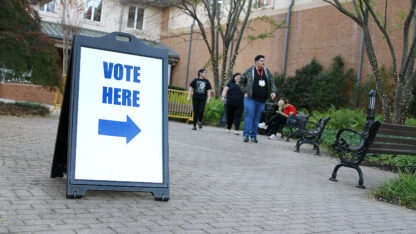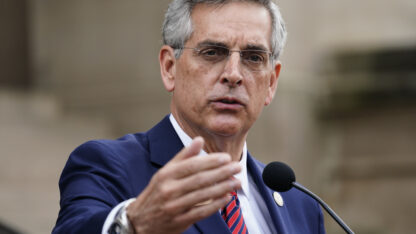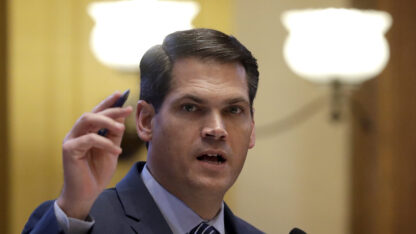About 27% of voters between the ages of 18-29 cast a ballot in the midterm election this year, according to an early estimate from the Center for Information and Research on Civic Learning and Engagement at Tufts University, also known as CIRCLE.
Researchers say the 2022 election had the second highest voter turnout among voters under 30 in at least the past three decades. So far, the highest turnout during a midterm for this voting bloc is 2018 when about 31% of young people who are eligible to vote cast a ballot.
During a briefing Thursday, Abby Kiesa — deputy director at CIRCLE — said 2018 remains “a high-water mark” for youth voter turnout during midterms in the U.S. since at least since the 1970s. Historically, youth voter turnout has hovered around 20% during midterm elections.
This year, Kiesa said turnout was significantly higher in some of the battleground states — including Florida, Georgia, Michigan, North Carolina, New Hampshire, Nevada, Ohio, Pennsylvania and Wisconsin. In aggregate, CIRCLE researchers found, turnout was roughly 31% in those states.
“Outreach, contact, investment in these states was higher,” Kiesa said. “So it’s not surprising that voter turnout is higher in these states.”
Young voters also had a significant influence on election outcomes in some of the key races in those battleground states.
According to CIRCLE, young people preferred Democratic candidates by a 28-point margin, which helped Democrats in statewide races that include the Pennsylvania U.S. Senate race and the Wisconsin gubernatorial race.
“Young people stood along in supporting, decisively, a Democratic statewide race candidate,” said Kei Kawashima-Ginsberg, the group’s director. “The result is that [young people] kept the races really close and in some cases we think they will decide the outcome of the race.”
Ruby Belle Booth, CIRCLE’s elections coordinator, said this year’s election represents “a continuation of high civic engagement” among young people in recent years. She said investments in organizations that mobilize young people year-round are key to improving voter turnout in this voting bloc. Booth said possibly a decrease in those kinds of investments this year could be why turnout this year was slightly lower than 2018.
“We saw in registration numbers that 18-19 year olds were not being engaged as much as they were in 2018,” she said. “And that’s a red flag that there isn’t as much work happening to register new voters.”
Copyright 2022 NPR. To see more, visit https://www.npr.org.
9(MDAxODM0MDY4MDEyMTY4NDA3MzI3YjkzMw004))

9(MDAxODM0MDY4MDEyMTY4NDA3MzI3YjkzMw004))








